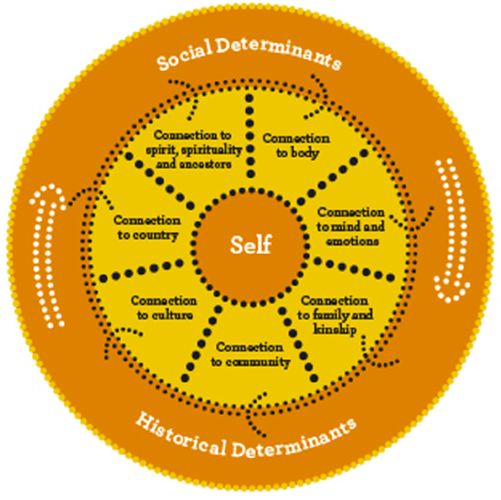
We aren’t separate from the world. We are intricately intertwined within it. Reminding ourselves of that and nurturing the connection points can be a good antidote to becoming limited in our field of view when stressed. I explore these ideas a bit in this post, especially as the end of the year is often a time we become quite inwardly focused. Reading time ~ 6 minutes.
In Aboriginal and Torres Strait Islander culture, the health and wellbeing of an individual is a function of the diversity and quality of connections they have to family, kin, community, culture, body/mind, country, spirit and ancestry. The ability to build and maintain those connections is either supported or blocked by broader social and historical conditions.
It is often represented in this diagram.

I can’t possibly do full justice to what this diagram communicates in a single post, but I would like to draw attention to a key idea.
Namely, that the health of our ‘self’ (our experience of who we are) is better and more robust when we have high quality connections across multiple categories.
In Western psychology, when we use the words ‘connections’ or ‘relationships’ it is usually to describe connection we have to people – our friends, family, colleagues.
But in the model above, ‘connections’ encompass a much broader set of categories. We can consider ourselves to be in relationships with many things simultaneously – our own bodies/minds, people, community, culture, country (land), spirit, faith and ancestors. We can also ask ourselves what is the depth and quality of those connections.
For example, what is the relationship I have with my body? Do I look after it with good food, exercise and sleep? Or do I neglect it through inactivity, drugs or alcohol?
What is the relationship I have with nature? Do I spend time in nature and gain benefit from it? Do I tend to ignore it?
And yes, we can assess the quality of the relationships we have with the people in our lives. Do I feel valued and loved? Do I have people that I value and love?
As the end of the academic year approaches we generally become a bit limited in our field of view. We have important tasks to finish and much of our attention is focused on them. We can become very inwardly focused. This isn’t unique to students. I see this in myself and colleagues when life gets busy and stressful.
In the process, we sometimes neglect some of these other connections – caring for body, engagement with friends and family, time in nature, nurturing our spirit. We take the view that allocating some of the resources we’d normally allocate to those other parts of our lives to our individual tasks will help get them done. In the short-term that can be the case.
But the neglect or severing of these other connections generally has significant negative medium to long-term implications – neglecting our health breeds illness. Neglecting our social connections breeds isolation. Neglecting our spirit breeds disconnection.
And so when times are tough, those are actually when we need to try, as best we can, to protect and nurture those connections. It might be as simple as going on a walk, talking to a friend, taking a moment to think about the big picture, prayer, spending some time in nature. The time commitment doesn’t need to be huge. The walk might only be 10 minutes. The conversation with a friend might just be a quick text exchange. We don’t need to make those connections perfect, just to keep them in place and a little protected.
Now doing so can have immediate benefits – for example a little bit of time spent outside helps me relax after too much time in front of the computer. But protecting and nurturing those connections also contributes to a longer-term benefit that is a rich and interconnected life. And a rich and interconnected life is typically one that is more robust to setbacks. And remember that for others, you might be the connection they are trying to, or wanting to nurture/protect. In reaching out, you may well find others reaching back.
So if you notice the challenges of the end of the year pushing you into a disconnected space, look for small opportunities to reach out and make contact with other aspects of life. And remember, that, in some cases, these connections involve professional supports – counselling, study advice, advocacy and financial support etc.
Take care everyone
Dr G

